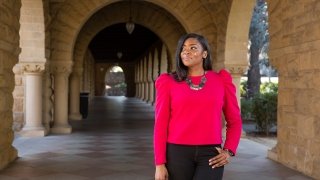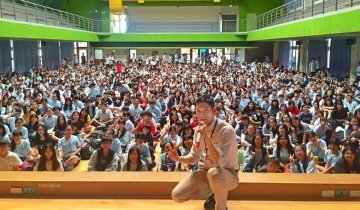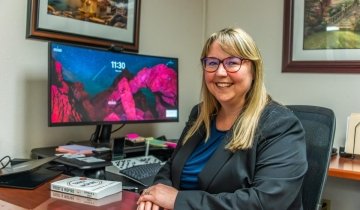Rosalind Conerly EdD ’16 was born in Long Beach, Calif., but as a young girl, she bounced around Southern California, from Compton to Rancho Cucamonga. The experience “forced me to figure out how to navigate spaces early,” she says, a skill she’s leaned on since moving some 350 miles north to take a position at Stanford University.
Last March, after working at USC since 2012, Conerly took on the new role of associate dean of students and director at Stanford’s Centers for Equity, Community, and Leadership. She oversees the university’s Black Community Services Center (BCSC), which focuses on intellectual development and advocacy of Stanford’s Black students and student groups.
The center, which was “created out of student activism” in 1969, Conerly says, celebrated its 50th anniversary last year and was looking for someone to “reshape and retool” it to mark the milestone.
No day is the same for Conerly. She manages 20 direct reports, a group that includes students and professional staff, and leads the center’s alumni engagement and donor relations.
The physical size of the Stanford campus—spread out across 8,180 acres—is much different from USC’s. Conerly is often out and about on campus, working from her laptop in between meetings and site visits, an ethos that no doubt draws from the Bay Area’s start-up culture.
And while there are the inevitable administrative tasks to complete and emails to write and reply to, a typical day can include a variety of activities, from emceeing a campuswide Dr. Martin Luther King Jr. celebration lunch to accompanying a student organization surveying a possible venue for a concert the group is planning.
Conerly’s time at USC—both as a student in the Doctor of Education in Educational Leadership program at USC Rossier and as director of the Center for Black Cultural and Student Affairs—prepared her for this new role. In particular, it “gave me the opportunity to really think about what it means to be a true scholar–practitioner,” she says. At USC Rossier, her research focused on cultural and community centers, and she thought critically about what it means to merge research and practice.
“The diversity of folks in the EdD program allowed me to really open up my mind to other ways that I can use this degree.” —Rosalind Conerly, EdD ‘16
One of Conerly’s primary tasks over the coming year is to create her vision for the BCSC, after taking the reins from a director who had held the role for 18 years. She’s been conducting a listening tour over the past few months, meeting with students, faculty and alumni.
She wants to be certain that she is “being intentional about the work that I’m doing and ensuring that it’s truly intersectional.” Although the center is focused on the Black student community, Conerly intends to “examine power structures at the university and see where those are in play and how they are impacting different parts of students’ identities.” Working with the other centers on campus—the Asian American Activities Center, Women’s Community Center and Native American Cultural Center, to name a few—is essential to ensuring “we are really, truly supporting students on campus,” Conerly says.
The relationships that Conerly formed at USC Rossier have also served her well, especially the connections made through the student organization Jenga, which she formed with seven other women in her EdD program.
Initially, Jenga—Swahili for “to build”—was created as a support network as the classmates finished their dissertations. But the group stayed in touch, and now the members connect one another with professional opportunities, whether in education or business. “The diversity of folks in the program allowed me to really open up my mind to other ways that I can use this degree,” Conerly says.
In addition to her new role at Stanford, Conerly is also building a consulting practice, working with employee resource groups, tech companies and universities looking to recruit employees and students of color.
Conerly misses USC—her colleagues, family, friends, the students she worked with and the “electric” energy of the Trojan campus. But she’s embraced one thing the Bay Area is known for: wine. Over the summer, she explored many wineries in the region, and she’s since taken this love further by enrolling in her first wine education course. “That’s the thing I’m doing for me,” Conerly says. “I love how wine creates community.”




